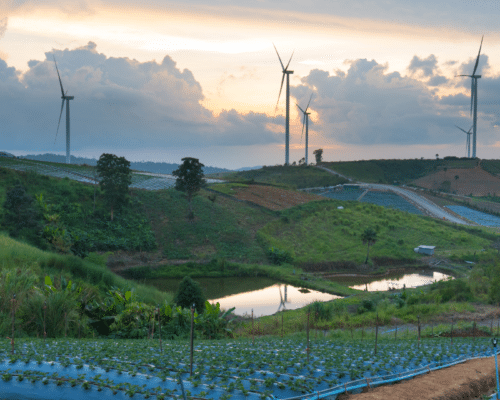Heatwaves in 2023: A Glimpse Into the Future of Climate Change
14 August 2023 – by Viktor Tachev Comments (0)
July 2023 has brought previously unseen heatwaves to countries worldwide, hinting that the worst of climate change is yet to come. While the impacts on communities, ecosystems and the economy are worsening every year, scientists’ calls for action continue to fall on deaf ears. Without a more ambitious and urgent collective response by global leaders, this July’s records will also soon be broken.
July 2023’s Heatwaves: Extreme Heat Hits a New Level
July 2023 became the hottest month in the past 120,000 years by a significant margin, according to scientists from the EU’s Copernicus Climate Change Service and the World Meteorological Organisation. Dr. Karsten Haustein from Leipzig University notes that the world was 1.5°C hotter than in the average July before industrialisation.
UN Secretary-General António Guterres even declared the era of “global warming” had finished and instead announced the arrival of the era of “global boiling”.
World Weather Attribution (WWA) research found that in July, southern Europe, parts of the United States, Mexico and China experienced severe heatwaves with temperatures above 45°C. In Eastern California, temperatures reached 53.3°C. China reached an all-time high national temperature of 52.2°C. Records were broken all over the world, including Spain, Italy, Algeria, Tunisia, France, Japan, Vietnam, the Philippines and more.
Considering that June also broke records, the summer of 2023 is shaping up to be the hottest in human history.
WWA scientists warn that climate change has also increased the length and frequency of heatwaves. In China, similar events are now at least 50 times more likely. They might appear once every 15 years in the US and Mexico. In Southern Europe and China, the frequency is down to once per decade and once every five years, respectively. Furthermore, the research concludes that climate change has made heatwaves hotter by 2.5°C in Europe, 2°C in North America and 1°C in China.
According to Climate Central, 6.5 billion people, or 81% of the population, experienced climate change-attributed heat in July.
The Causes of the Heatwaves
Dr. Friederike Otto, one of the authors of the WWA study, said that the results were not surprising.
“The world hasn’t stopped burning fossil fuels, the climate continues to warm, and heatwaves continue to become more extreme. It is that simple,“ she said.
Similarly, Climate Central’s analysis notes that heat stress will get more frequent and intense as long as we continue to burn coal, oil and natural gas.
Yet, the fossil fuel industry, the biggest contributor to climate change and reportedly knew about it since the 1970s, continues to ignore warnings.
In 2022, five of the leading oil and gas giants hit record profits of nearly USD 200 billion. At the same time, just between 1% and 8.6% of the industry’s capital expenditures have gone towards decarbonisation activities. Instead, companies have prioritised investing in new fossil fuel projects, paying dividends and performing stock buybacks.
Furthermore, the industry has a well-documented history of greenwashing activities. To date, oil giants are spending hundreds of millions on green PR while simultaneously backtracking on their emissions reduction targets.
Dr. Robert J. Brulle, visiting professor of environment and society at Brown University, addresses the problems with these tactics:
“Rather than publicly state their knowledge and seek to address this problem, these corporations implemented a program of scientific misinformation to mislead the public, lobbied to prevent actions to mitigate climate change, and invested vast sums in public relations campaigns to convince the public and the government that there was no need to act to stop climate change, all in attempts to maintain their business as usual and maintain their profits. These campaigns continue to this day.”
The Impact of Heatwaves on the Economy
The unprecedented heatwaves damaged physical assets and harmed agricultural production. They mounted pressure on the healthcare systems, increased the energy costs of businesses, disturbed labour productivity and reduced economic output.
In many countries, July’s heatwave extended into August. Iran, for example, decided to shut down the entire country for two days.
Since the 1990s, climate change has cost the global economy about USD 16 trillion. Developing nations and low-lying regions are paying a major part of this price.
In the US alone, the climate change bill will likely top USD 2 trillion annually. Worldwide, it will cost between 4% and 18% of the global GDP, with Asia suffering the biggest losses. China, for example, could lose up to 24% of its economic output without climate change action.
Oxford Economics finds that even 2.2°C of warming by 2050 could reduce global GDP by up to 20%, while Deloitte estimates climate change’s costs could total USD 178 trillion by 2070.
Taking a Toll on the Environment and Society
According to the WHO, intense heat stress can cause severe dehydration, acute cerebrovascular accidents, heat stroke, disease outbreaks and death. Furthermore, elevated temperatures can significantly increase mental health-related morbidity and mortality.
Estimates reveal that the 2022 heatwaves in Europe took the lives of over 61,000 people. In 2023, countries, including the US, Italy, Japan and Mexico, have reported steep jumps in hospital admissions and mortality due to the soaring temperatures.
According to Dr. Friederike Otto from WWA, without immediate action, tens of thousands of people will keep dying from heat-related causes each year.
Heatwaves can also cause the emergence of climate migrants, as seen in Bangladesh.
Moreover, the impacts of heatwaves are also felt in other ecosystems. A Copernicus study showed that global ocean surface temperatures for June reached unprecedented levels for that time of the year.
Sea ice levels in Antarctica have reached an all-time low, crushing last year’s record. Scientists have also observed similar events in Greenland, where ice sheets are melting at “a record pace”.
More research published in July warned that, due to the climate crisis, a vital system of ocean currents could collapse as early as 2025, causing devastating consequences for the global climate system.
How to Prevent Heatwaves – Seeking a Way Out
Scientists warn that unless every Paris Agreement signatory fully implements its current pledges to rapidly cut emissions, the temperature rise will reach 2°C in around 30 years. As a result, events like the current heatwave will start occurring every two to five years.
According to Dr. Friederike Otto, we still have time to secure a safe and livable future. To do that, the world needs to stop burning fossil fuels and improve the disaster preparedness of the most vulnerable and affected communities.
Leaving Fossil Fuels in the Past
The number one priority for global leaders and policymakers is not to crumble under the pressure of the fossil fuel lobby and finally seal the phase-out of fossil fuels at the COP28 conference this year.
G20 countries, which collectively account for 80% of global emissions, should take the lead.
OECD nations should present plans for exiting coal by 2030. The rest of the world should do the same no later than 2040.
As per the IEA’s recommendations, achieving net-zero by 2050 requires no new fossil fuel infrastructure. Alternatively, governments should stop planning for new capacity, while financial institutions should no longer fund coal, oil and gas projects.
Scaling Up Renewable Energy
According to Christiana Figueres, UN climate chief 2010-2016, one-third of global electricity can be produced by solar and wind alone. However, targeted national policies have to enable that transformation. Otherwise, we will “all scorch and fry”, she says.
The focus should be solely on solar, wind and other zero-emission fuels. Ammonia co-firing schemes, non-green hydrogen or low-emission technologies shouldn’t be the focus of national policies.
While investments in renewables are already soaring, the pace should be increased. The most efficient tool for this is making national policies more welcoming to private green capital providers. Clean energy financing needs can be adequately addressed through regulatory reforms, different types of incentives and innovative investment mechanisms.
Investing in Adaptation and Mitigation
Multilateral development banks, governments, civil society and businesses should collectively ensure that the most vulnerable are protected against climate change’s worst impacts.
The nations on the front lines should receive sufficient funding, which so far has remained an empty promise.
Investments are needed in both disaster preparedness and recovery. For example, the UN suggests that every person on Earth is covered by an early warning system no later than 2027. The development of local and regional Heat Adaptation Plans is also critical. Other necessary measures include transforming cities to ensure they can adequately host climate refugees, improving public health systems, providing sufficient clean drinking water supplies, building more green spaces in urban areas, installing flood control mechanisms and more.
Possible sources for the funding needs for loss and damage include carbon pricing mechanisms and windfall taxes on oil and gas companies.
Making 2023 Heat Waves a One-off Event
For the most part, global leaders have ignored the warning signs, but if there is a time to listen, it is now. To keep the 1.5°C target alive, GHG emissions must peak before 2025 and drop by 43% by 2030. According to scientists, if we don’t stop burning fossil fuels immediately, the summer we are witnessing will be considered cool in the future.
Current government policies are taking average temperatures on a course to rise by 2.8°C above pre-industrial levels by the end of the century. According to the IPCC, this would destroy multiple ecosystems and trigger cascading and interacting disasters. While the solution is simple, the question is: will global leaders opt for it?
However, there is still time to salvage the situation. The Africa Climate Summit, the G20 Summit, the UN Climate Ambition Summit and COP28 are all opportunities to declare the end of fossil fuels. The future is in world leaders’ hands.
This article is available in the Japanese language on Energy Tracker Japan.
by Viktor Tachev
Viktor has years of experience in financial markets and energy finance, working as a marketing consultant and content creator for leading institutions, NGOs, and tech startups. He is a regular contributor to knowledge hubs and magazines, tackling the latest trends in sustainability and green energy.
Read more



